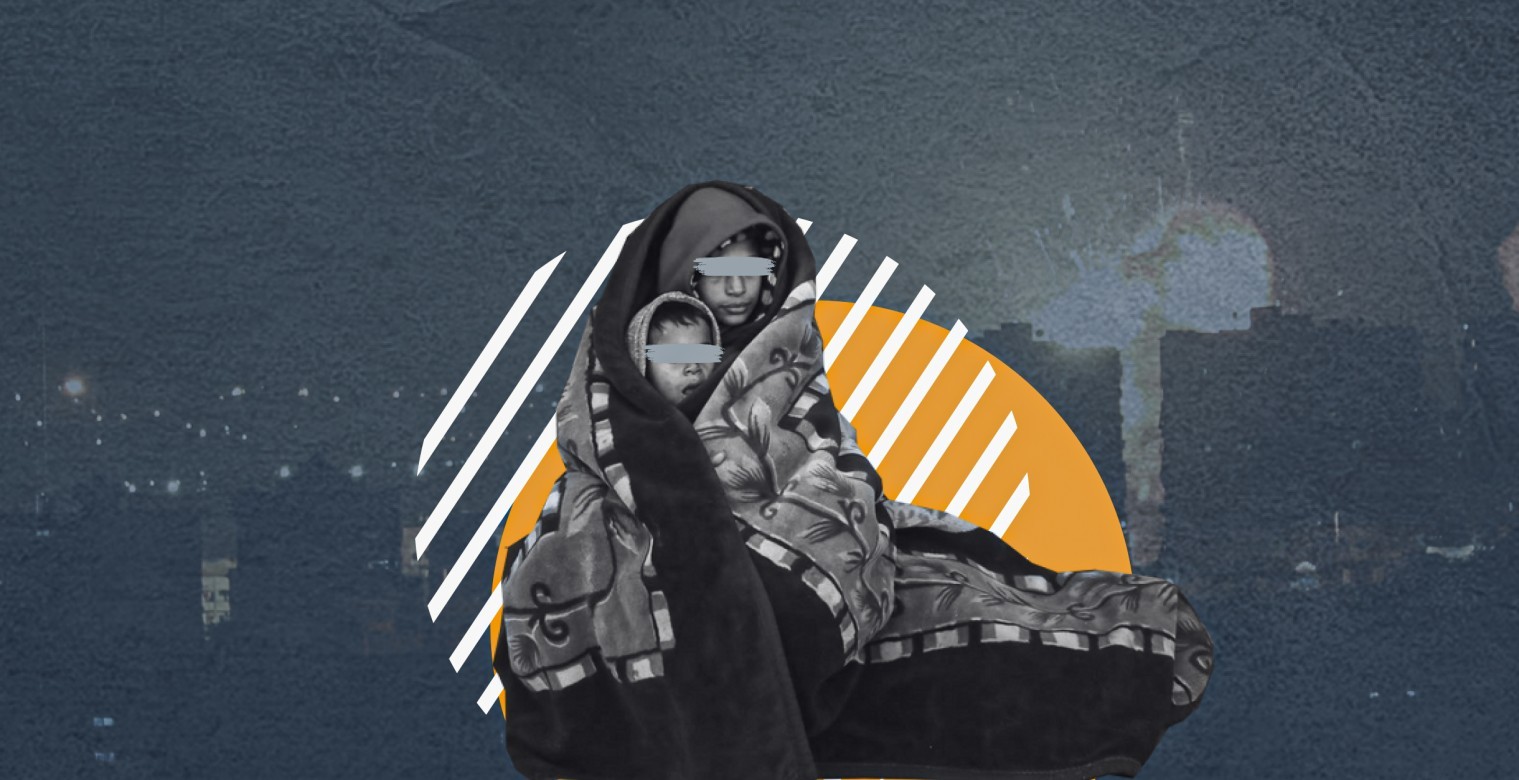At some point and without warning, Israeli air forces attacked separate areas of the Gaza Strip. Fear grips the hearts of the civilian population, especially children who do not have space to escape or take shelter from a shell that may put an end to their lives, especially since there are no shelters.
Civilians in Gaza, in such a military confrontation, have no choice but to open the windows of their homes in anticipation of glass falling on the faces of its inhabitants. Mothers who are preoccupied with protecting their children are often do this act.
While the scorpions were pointing to one o'clock A.M, Amani Omar, 34, was trying to hide her concern for her children. The lady perched on a hill of her children's clothes after she had taken them out of the closet without realizing it and began rearranging them again.
Amani said she does this out of instinct, to find an excuse to stay among her sleeping children for fear of a bombing that might affect the vicinity of her house in the west of Gaza City and startle them. Also, to escape from the vigorous follow-up on the news broadcast by social media groups about the areas of targeting that the aviation is attacking.
Despite this, Amani's three children woke up terrified after a loud explosion occurred about a kilometer away from her home, which is adjacent to the seashore. The lady says, "At such moments, I feel a lot of panic. I embrace them, I hide their faces in my chest, and pat their backs... Don't be afraid, Mama... This is all I can do."
Amani, who works for an international organization, added, "In fact, I feel that my ability to reassure them is fading time and time again because the bombing is an ongoing act from time to time, and it makes my children always ask me: When will the aggression end, Mama? This is sufficient evidence that they feel constant fear."
The Israeli air force launched a bombardment on separate areas of the Gaza Strip at dawn on Wednesday (May 3) in response to the rocket shells fired by the resistance forces from the Gaza Strip following the announcement of the death of Palestinian prisoner Khader Adnan, who had been on a hunger strike in the occupation prisons for 86 days.
While the shelling and rocket exchange was taking place, the young woman, Rola Muhammad (20 years old), from eastern Jabalia in the northern Gaza Strip, didn't stop communicating with her fiancé to decide whether they should continue or stop doing arrangements for their wedding, which is scheduled to take place this evening.
Rola, with tears in her eyes, says, "My fiancé does not have an answer, and we are both discussing with his family to decide the fate of Farah, but we thought to put things on hold until the morning. I'm holding my breath waiting to hear the news of a truce between the two parties, meaning (Israel and the Palestinian resistance).
The girl, who is a law student at Al-Azhar University in Gaza, adds, "Can you imagine how a girl spends her wedding night crying in fear and anxiety that replaces joy with sadness as a result of this aggression!" She indicated that she and her fiancé will not surrender to this reality and are determined to achieve the dream of engagement. "We are a people who deserve joy," she said while shedding tears in her eyes.
On the other hand, Abdul Rahman Saeed (25 years old) was able to complete his wedding ceremony on Tuesday evening before the "bombing party" began, as the people of Gaza call it.
Abdul Rahman, a resident of the Sheikh Radwan neighborhood north of Gaza City, says, "We ended the celebration early before the bombing escalated. The concert program was scheduled to last until 10 p.m., but we left at least an hour and a half early."
This reality raises many questions in the minds of the residents of the Gaza Strip, who have been under siege for more than a decade and a half. The most important of which is: why are there no shelters in which the civilian population can take refuge?
It's clear that neither the locally responsible authority nor international organizations have sought or sponsored such a proposal to protect the civilian population and dispel their fears since the first aggression on Gaza in the fall of 2008, in which various forms of heavy rockets were used.
According to the testimonies of elderly people who witnessed air attacks in the fifties and sixties on Gaza, the shelters were established immediately after the 1956 aggression by the decision of the Egyptian army and were distributed among three governors out of five at the level of the Gaza sector, which has an area of 365 square kilometers.
Data on the ground indicate that these shelters have completely disappeared, and none of the seventies generations, at least, mentioned anything about this fortification, which was used to shelter civilians during military attacks.
The civilian population usually takes refuge whenever the bombing intensifies, by resorting to the United Nations Relief and Works Agency (UNRWA) schools, to protect itself in the absence of safe places.
Abdullah Abu Salem (49 years old) from the northern Gaza Strip says, "For 16 years, war has dominated the daily lives of people in this afflicted country. Bombardments and shells have rained down from the sky at any time, sometimes without warning. Despite this, no one has thought of creating shelters similar to those in the occupation state, which calls on its residents to go down to the shelters whenever the bombing intensifies."
Abu Salem, who is unemployed due to chronic diseases, added, "The lack of a safe place where people can take shelter is a real disaster. Additionally, the occupation does not distinguish between civilian or military installations, as all of them are within range of missiles."
The Fourth Geneva Convention of 1949 recognizes the need to protect civilians in times of armed conflict. It is considered the first legal organization and international agreement for the protection of civilians during conflicts.
The Geneva Convention requires conflicting parties to distinguish between the civilian population and combatants. The term civilian population includes all civilians residing in the territory of belligerent countries and the civilian population residing in the occupied territories.
In describing a civilian, the agreement states that they are every person who does not participate directly in hostilities. If there is doubt about whether a person is a civilian or a military person, the adjective of the civilian prevails. This protection extends to participants in medical services, relief work, journalists, and civil defense personnel. However, reality records periodic violations of all that was stated in the agreement.
Regarding this, Palestinian human rights activist Esam Younes says: "Israel, the occupying power, has committed what amounts to war crimes and crimes against humanity throughout the Palestinian territory."
Younis, who holds the position of Vice President of the Arab Organization for Human Rights, added: "Despite the fact that these crimes were committed, especially during the aggression on the Gaza Strip, justice is far from being achieved. Civilians and their rights continue to be sacrificed, and the occupation continues to commit crimes without a minimum level of justice for the victims."
He also noted that the occupation is not applying the rules of law, especially the rules of impeachment, and ensuring that criminals do not escape with their crimes.


